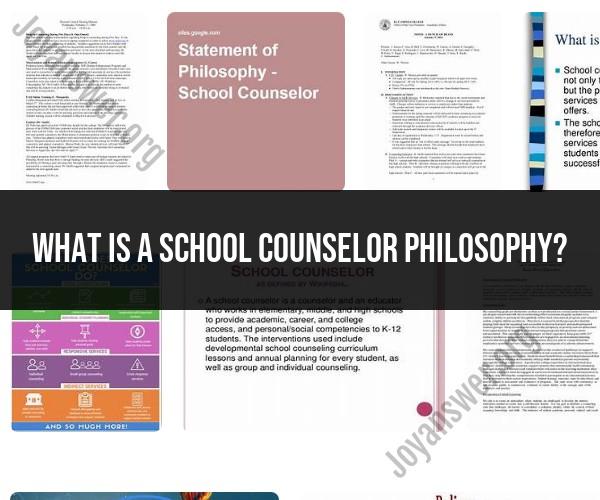What is a school counselor philosophy?
A school counselor philosophy is a set of beliefs, principles, and values that guide the practice and approach of a school counselor in their role within an educational setting. It serves as a foundation for their work and provides a framework for how they interact with students, parents, teachers, and the school community as a whole. A well-defined school counselor philosophy helps counselors clarify their mission and goals in promoting the academic, social-emotional, and career development of students.
Key components of a school counselor philosophy may include:
Student-Centered Approach: A belief in putting the best interests of students at the forefront of all counseling efforts. The philosophy emphasizes the importance of understanding and meeting the individual needs of each student.
Advocacy for Students: A commitment to advocating for students' rights, well-being, and equitable access to educational opportunities. This includes advocating for students with diverse backgrounds and needs.
Holistic Development: Recognizing that students are unique individuals with multifaceted needs. A philosophy of holistic development emphasizes addressing students' academic, social, emotional, and career development to help them become well-rounded individuals.
Data-Driven Decision-Making: A commitment to using data and assessment tools to inform counseling interventions and to measure the impact of counseling services on student outcomes.
Collaboration: An understanding of the importance of collaboration with teachers, parents, administrators, and other stakeholders to create a supportive and nurturing school environment.
Ethical and Professional Conduct: A dedication to upholding the ethical standards and guidelines set forth by professional counseling organizations, such as the American School Counselor Association (ASCA) or relevant regional associations.
Cultural Competence: An awareness of and respect for cultural diversity and the ability to work effectively with students and families from diverse backgrounds.
Continuous Learning: A commitment to ongoing professional development and staying current with best practices and research in the field of school counseling.
Confidentiality: A strict adherence to maintaining confidentiality in counseling relationships, with a clear understanding of when and how exceptions may apply, such as when there is a risk to a student's safety.
Promotion of Resilience and Well-Being: A belief in promoting resilience, emotional well-being, and mental health among students to help them overcome challenges and succeed academically and personally.
Each school counselor's philosophy may be unique and shaped by their personal values, experiences, and the specific needs of the school community they serve. A well-articulated philosophy helps school counselors stay focused on their mission and ensure that their counseling services align with the best interests of the students they serve.
Unpacking the Philosophy of School Counselors
School counselors are professional educators who provide students with the academic, social, and emotional support they need to succeed. School counselors work with students individually and in groups to help them develop the skills and knowledge they need to thrive in school and in life.
The philosophy of school counseling is based on the belief that all students have the potential to succeed. School counselors believe that students learn best in a safe and supportive environment where they feel valued and respected. School counselors also believe that students need to develop a variety of skills and knowledge in order to be successful in school and in life, including academic skills, social skills, and emotional skills.
School Counselor Philosophy: Core Principles and Beliefs
The following are some of the core principles and beliefs of school counseling:
- All students have the potential to succeed. School counselors believe that all students have the ability to learn and grow. They work with students to identify their strengths and weaknesses, and to develop a plan to reach their full potential.
- Students learn best in a safe and supportive environment. School counselors create a safe and supportive environment where students feel comfortable asking for help and taking risks. They also work with teachers, administrators, and parents to create a positive school climate.
- Students need to develop a variety of skills and knowledge in order to be successful. School counselors help students to develop academic skills, social skills, and emotional skills. They also teach students about career development and life planning.
Developing Your Personal School Counselor Philosophy
Your personal school counselor philosophy is a statement of your beliefs about the role of school counselors and the best way to support students. It should be based on your own values and experiences, and it should guide your work as a school counselor.
To develop your personal school counselor philosophy, consider the following questions:
- What do I believe about the role of school counselors?
- What do I believe about the best way to support students?
- What are my values as a school counselor?
- What are my strengths and weaknesses as a school counselor?
- What are my goals as a school counselor?
Once you have considered these questions, write a statement that expresses your personal school counselor philosophy. This statement should be clear, concise, and easy to understand. It should also be meaningful to you and guide your work as a school counselor.
Here is an example of a personal school counselor philosophy statement:
I believe that all students have the potential to succeed, and that school counselors play a vital role in helping students reach their full potential. I am committed to creating a safe and supportive environment where students feel comfortable asking for help and taking risks. I also believe that students need to develop a variety of skills and knowledge in order to be successful in school and in life. I am passionate about helping students to develop their academic skills, social skills, and emotional skills. I also believe that it is important to teach students about career development and life planning.
Your personal school counselor philosophy is a living document that should be reviewed and updated regularly. As you grow and learn as a school counselor, your philosophy may evolve. This is perfectly normal. The important thing is to have a philosophy that is meaningful to you and that guides your work as a school counselor.













